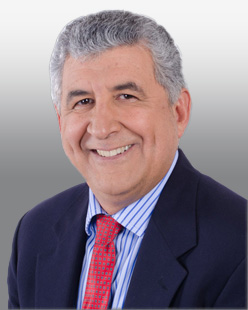
Case Manager: Zuzana Bastow
The Honorable Luis A. Rodriguez brought to his civil courtroom a set of unique and extraordinary trial management skills, which earned him the reputation of being a judge who is attuned to what the attorneys before him are advocating. On the bench, he was known for being fair, flexible and patient as well as focused, effective and efficient, whether in law and motion, trial or settlement. His unique abilities were recognized by the legal community, having been honored as Judge of the Year by the Orange County Bar Association’s Business Litigation Section in 2011.
Since retiring from the bench in 2014, Judge Rodriguez has taken the expertise gained from his 34-year legal career, including 20 years as a trial judge, and applied those skills to his mediation and arbitration practice to help litigants resolve disputes. He has arbitrated cases and rendered awards in employment, including wage & hourly and FEHA claims, real estate, business, and insurance disputes. He has resolved over 100 cases through mediation, achieving a substantial rate of settlement.
Judge Rodriguez continues to strengthen his skills in mediation and arbitration by participating in numerous continuing education conferences and training programs. He most recently attended the American Bar Association Institute for Mediation.
VIRTUAL DISPUTE RESOLUTION
Judge Rodriguez is available to conduct hearings remotely via secure videoconferencing. He has attended numerous webinars and training programs on how to best leverage the technology offered by Zoom, and how to best achieve resolution via a virtual platform.
COMPLEX LEGAL ISSUES
Judge Rodriguez is renowned for being a judge who embraces complex legal issues. One article about him said, “Not many judges can examine an expert witness, off the cuff, about covalent ions. Orange County Superior Court Judge Luis A. Rodriguez can and did.” This is the inquisitive mind that distinguishes him. He seeks to understand and engage while at the same time keeping focus on the goal to resolve the legal issues. He has continued this in his mediation practice, successfully meshing his substantial legal experience with his passion for problem solving. Using this approach, Judge Rodriguez has amassed a successful settlement record.
LAW & SCIENCE
Judge Rodriguez’s thirst for knowledge has been a hallmark of his professional life. He initially majored in Biology at the University of California at San Diego. In his judicial career, he used this science background to engage in projects that sought to integrate science in the law. For example, he participated in the Science and Law committee of the courts. In that capacity, he participated in a education program partnering with distinguished legal scholars creating an innovative program discussing pros and cons of using Neuroscience Evidence in the Courtroom, entitled “The Brain on Trial” presented at science and neuroscience conferences. “Brain on Trial” is accessible through the following link: http://www.abc.net.au/radionational/programs/allinthemind/the-brain-on-trial/3038790
Business-minded Solutions
Judge Rodriguez has developed significant expertise in resolving commercial litigation issues with business-minded solutions. Using his science background, Judge Rodriguez founded a creative and innovative company in his native Costa Rica, which sourced unique health and wellness products from American and European Manufacturers. This company was sold in 2015. With this entrepreneural venture, he brings to his practice a “real world view” adding value to his successful career in public law and on the bench, which he employs in mediating complicated business disputes.
Judge Rodriguez has authored numerous articles. Among his accomplishments, he is especially gratified with the authoring of an exceptional manual on the Individual Disabilities Education Act circulated to Juvenile courts during his tenure on the court.
Judge Rodriguez has presented numerous CJER education programs dealing with subjects in Civil and Criminal law. Since retiring, Judge Rodriguez has continued developing MCLE-accredited programs for attorneys discussing the admissibility of scientific evidence in the courtroom, and the judge’s role in dealing with attorney substance abuse presented at the 2015 and 2016 state bar conferences.
Judge Rodriguez was born in Costa Rica and is fluent in Spanish.
“Judge Rodriguez did a great job in trying to steer the parties toward settlement. I could tell that he was well prepared and understood the issues. I would both use him again and recommend him to other attorneys. His Spanish-speaking skills were also very useful.”
“Judge Luis Rodriguez is a really awesome mediator. Highly impressed and would definitely recommend.”
